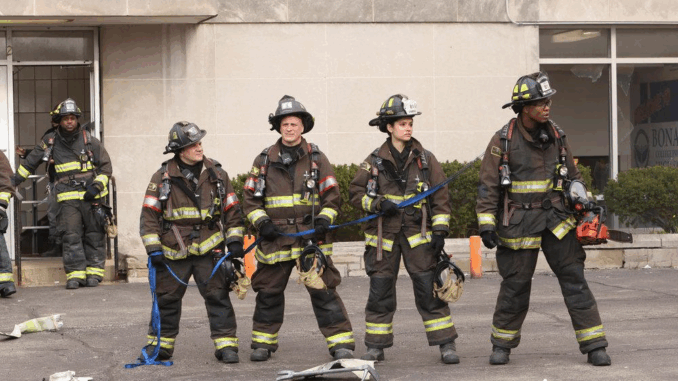
The One Chicago universe is no stranger to dramatic cast shake-ups, but few exits have been met with the intense scrutiny and heartache as the recent departure of Daniel Kyri, who played Firefighter Darren Ritter on Chicago Fire for seven seasons. Originally only scheduled for a three-episode arc, Kyri grew his role into a beloved main character, making his sudden exit at the start of Season 14 a major blow to Firehouse 51.
While initial reports pinned his departure on NBC’s network-wide budget cuts, a more nuanced and emotionally resonant picture has emerged. Kyri’s candid reflections on his time on the show have linked his final decision not just to financial constraints, but to a significant and palpable shift in the set’s dynamic—a change he suggests was amplified by the return of leading man Taylor Kinney (Lieutenant Kelly Severide) from his own personal leave of absence. Kyri’s own words imply that the return of one star was inextricably linked to the departure of another, suggesting “It Changed Everything.”
The Elephant in the Firehouse: Budget Cuts and the Core Cast
To understand Kyri’s exit, one must first acknowledge the cold reality of long-running network television. As ensemble shows age, their budgets rarely keep pace with rising salaries, and cost-cutting measures become inevitable.
In the period leading up to Kyri’s departure, the One Chicago franchise was widely reported to be tightening its belt, leading to the painful exits of not only Kyri but also Jake Lockett (Sam Carver). Showrunner Andrea Newman herself hinted at the pressure, teasing that a “lot of turnover and a lot of craziness” was coming to the CFD due to budget constraints.
For fans, Ritter’s removal was baffling. As an openly gay Black firefighter who embodied empathy and humility, the character was a vital source of authentic representation that the franchise is now losing. Furthermore, his departure meant Firehouse 51 was shedding another beloved, long-tenured character in a worrying trend that saw the cast diversity diminish.
The publicly stated reason, therefore, was budgetary. However, Kyri’s poignant social media posts and subsequent interviews suggest that the way the cuts were handled, and the subsequent shifting priorities on set, became the true catalyst for him moving on.
The Severide Effect: A Shifting Center of Gravity
Taylor Kinney’s temporary, ten-month leave of absence to deal with a personal matter created a massive void in Chicago Fire and significantly altered the show’s structure. Squad 3, Stella Kidd, and the entire Firehouse 51 team had to adjust to Severide’s absence, forcing other characters to step up and carry the narrative weight.
Daniel Kyri’s Darren Ritter was one of the actors who rose to the challenge.
The gap left by Kinney meant characters like Ritter, Carver, and Violet Mikami (Hanako Greensmith) enjoyed a necessary and welcome increase in screen time and crucial storylines. This period allowed actors who were once considered supporting cast to develop genuine main character momentum.
The Return and the Rebalance
Kyri’s unspoken “It Changed Everything” moment seems to have coincided with Taylor Kinney’s triumphant return as Severide. While the return was an enormous win for the network and a massive relief for “Manstead” (Severide/Kidd) fans, it dramatically shifted the focus back to the core, established stars—which, in a budget-conscious environment, often means less screen time and fewer central storylines for the newer main cast members.
The narrative center of gravity in Firehouse 51 is, and always has been, Severide and Casey. When Kinney returned, the show’s priorities naturally shifted back to him and his storyline with Stella Kidd. For a talented actor like Kyri, who had spent the better part of a season stepping into the spotlight, this rebalancing—combined with the looming threat of budget-induced cast cuts—may have crystallized the sense that his professional growth on the show had reached its ceiling.
Kyri’s own commentary has focused heavily on his emotional connection to the character and his need for new artistic pursuits:
“My first-ever TV gig… turned into seven incredible years… I intend to carry what I’ve learned from you to every set in the future,” he wrote in his heartfelt goodbye, emphasizing the desire for future momentum.
While he never directly accused Kinney’s return of forcing him out, the sequence of events is clear: a brief moment of prominence during the Chicago Fire vacuum, followed by the budgetary cuts, and the return of a high-profile lead whose presence ensures that future spotlight moments for others will be rare. Kyri, a highly ambitious actor, recognized this turning point as the signal that it was time to walk away and seek roles that offer a larger, more consistent platform.
A Legacy of Representation and Growth
Despite the heartbreak of his exit, Daniel Kyri leaves an indelible mark on Chicago Fire. His portrayal of Darren Ritter was a significant step forward for representation, and his character’s genuine, gentle demeanor offered a crucial contrast to the often hyper-masculine world of firefighting.
His final scenes in Season 14 provided a touching, if brief, farewell, with Ritter reconnecting with his ex-boyfriend and opting for a life change—a proper send-off that many One Chicago characters are not afforded.
In the end, Kyri’s exit is a story of artistic ambition meeting network economics. The moment Taylor Kinney returned solidified the show’s established hierarchy, making it clear where the creative resources and screen time would be primarily focused. For Daniel Kyri, that was the signal: the time for his own next chapter had arrived. His departure is a bittersweet turning point, one that reminds fans that even beloved characters must eventually pursue their own fire, even if it means leaving the comfort and family of Firehouse 51 behind.